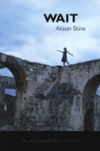Wait
The title of Alison Stine’s collection Wait—and the repetition of this word in its multitudinous forms throughout the work—suggests a passivity and loss or relinquishment of control, which seem to be the driving force behind much of the book’s thematic content. Wait presents itself from an almost stark, feminine—if not feminist—perspective, with subjects who are distant and passive, but not without some veiled level of control. This power is deployed, among other means, through the forcefulness and tight control of the poet’s language, in sharply crafted poems which alternate between small consistent selections of loose forms. In one line alone, the talented Stine has the power to simultaneously wax nostalgic about a carefree, country childhood and come down critically on misogyny and the notion of the patriarchy.
The title of Alison Stine’s collection Wait—and the repetition of this word in its multitudinous forms throughout the work—suggests a passivity and loss or relinquishment of control, which seem to be the driving force behind much of the book’s thematic content. Wait presents itself from an almost stark, feminine—if not feminist—perspective, with subjects who are distant and passive, but not without some veiled level of control. This power is deployed, among other means, through the forcefulness and tight control of the poet’s language, in sharply crafted poems which alternate between small consistent selections of loose forms. In one line alone, the talented Stine has the power to simultaneously wax nostalgic about a carefree, country childhood and come down critically on misogyny and the notion of the patriarchy.
Wait is replete with language depicting loss, absence, and indirectness. The poems in this collection insist—often frantically or menacingly—upon the acts of waiting and watching, establishing a distant and voyeuristic aura. Certain elements of “humanity” become terrifying, ominous, and seemingly inevitable in Stine’s narrative of vulnerability and defeat with minimal reclaiming. The narrator’s body is often dissolved or silenced at the conclusion of a poem.
The narrator emphasizes her delicateness, figuratively reducing herself, becoming “a bird in the field” in “Wife,” a poem about marriage. “The Land” again picks up the important subject of varied human relationships, depicting a failed relationship in the larger context of the universe. Stine reintroduces an oscillating scope, emphasizing the dark elements of human connection, but shifting scale to reflect their relative meaninglessness in the context of cosmic largeness. Size is integral to this work in both the realms of perspective as well as the metaphorical signifier.
A frequently errant physical landscape is also integral to the success of Stine’s work, operating as the complementary or conflicting backdrop to a sensual and tactile world. In a collection about waiting, retreating, and being acted upon against one’s will, landscape in its literal paleness, natural fragility, emptiness, or chaos is reflective of the loss of purity and innocence. Landscape—beyond the realm of control—is a place to disappear, but can also present an opportunity to stand out.





